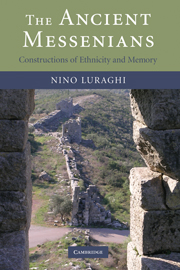32 results
Chapter 2 - Folktale and Local Tradition in Charon of Lampsacus
- from Part I - Myth, Fiction, and the Historian’s Authority
-
-
- Book:
- The Authoritative Historian
- Published online:
- 02 December 2022
- Print publication:
- 26 January 2023, pp 41-61
-
- Chapter
- Export citation
7 - Oracular Tales before Historiography
-
-
- Book:
- Divination and Prophecy in the Ancient Greek World
- Published online:
- 22 December 2022
- Print publication:
- 05 January 2023, pp 169-191
-
- Chapter
- Export citation
4 - Xenophon’s Place in Fourth-Century Greek Historiography
- from Part I - Contexts
-
-
- Book:
- The Cambridge Companion to Xenophon
- Published online:
- 12 January 2017
- Print publication:
- 15 December 2016, pp 84-100
-
- Chapter
- Export citation
Chapter 15 - Traces of federalism in Messenia
-
-
- Book:
- Federalism in Greek Antiquity
- Published online:
- 05 November 2015
- Print publication:
- 05 November 2015, pp 285-296
-
- Chapter
- Export citation
Chapter 10 - Messenians in the Empire
-
- Book:
- The Ancient Messenians
- Published online:
- 22 September 2009
- Print publication:
- 01 May 2008, pp 292-329
-
- Chapter
- Export citation
Chapter 4 - The conquest of Messenia through the ages
-
- Book:
- The Ancient Messenians
- Published online:
- 22 September 2009
- Print publication:
- 01 May 2008, pp 68-106
-
- Chapter
- Export citation
General index
-
- Book:
- The Ancient Messenians
- Published online:
- 22 September 2009
- Print publication:
- 01 May 2008, pp 384-389
-
- Chapter
- Export citation
List of illustrations
-
- Book:
- The Ancient Messenians
- Published online:
- 22 September 2009
- Print publication:
- 01 May 2008, pp xiv-xiv
-
- Chapter
- Export citation
Acknowledgments
-
- Book:
- The Ancient Messenians
- Published online:
- 22 September 2009
- Print publication:
- 01 May 2008, pp ix-xi
-
- Chapter
- Export citation
Chapter 8 - The liberation of Messene
-
- Book:
- The Ancient Messenians
- Published online:
- 22 September 2009
- Print publication:
- 01 May 2008, pp 209-248
-
- Chapter
- Export citation
List of abbreviations
-
- Book:
- The Ancient Messenians
- Published online:
- 22 September 2009
- Print publication:
- 01 May 2008, pp xii-xiii
-
- Chapter
- Export citation
Chapter 6 - The Western Messenians
-
- Book:
- The Ancient Messenians
- Published online:
- 22 September 2009
- Print publication:
- 01 May 2008, pp 147-172
-
- Chapter
- Export citation
Bibliography
-
- Book:
- The Ancient Messenians
- Published online:
- 22 September 2009
- Print publication:
- 01 May 2008, pp 345-376
-
- Chapter
- Export citation
Chapter 11 - Conclusions
-
- Book:
- The Ancient Messenians
- Published online:
- 22 September 2009
- Print publication:
- 01 May 2008, pp 330-344
-
- Chapter
- Export citation
Chapter 5 - Messenia from the Dark Ages to the Peloponnesian War
-
- Book:
- The Ancient Messenians
- Published online:
- 22 September 2009
- Print publication:
- 01 May 2008, pp 107-146
-
- Chapter
- Export citation
Chapter 1 - Introduction
-
- Book:
- The Ancient Messenians
- Published online:
- 22 September 2009
- Print publication:
- 01 May 2008, pp 1-14
-
- Chapter
- Export citation
Chapter 3 - The return of the Heraclids and the mythical birth of Messenia
-
- Book:
- The Ancient Messenians
- Published online:
- 22 September 2009
- Print publication:
- 01 May 2008, pp 46-67
-
- Chapter
- Export citation
Contents
-
- Book:
- The Ancient Messenians
- Published online:
- 22 September 2009
- Print publication:
- 01 May 2008, pp vii-viii
-
- Chapter
- Export citation
Index locorum
-
- Book:
- The Ancient Messenians
- Published online:
- 22 September 2009
- Print publication:
- 01 May 2008, pp 377-380
-
- Chapter
- Export citation

The Ancient Messenians
- Constructions of Ethnicity and Memory
-
- Published online:
- 22 September 2009
- Print publication:
- 01 May 2008



